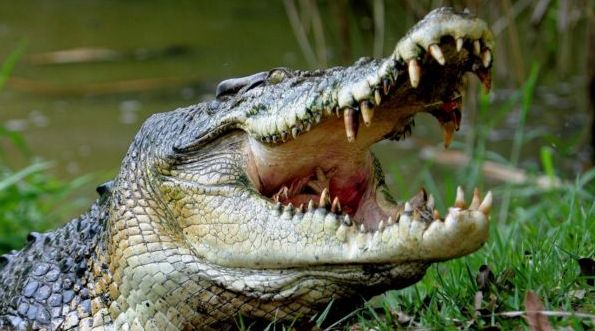Kendrapara: With salt-water crocodiles stealthily sneaking into farmlands, farming activities has been hit in several river-side villages in Kendrapara district.
After crocodiles were sighted in waterlogged agriculture fields many farmers have skipped transplantation work in several villages of Rajnagar and Rajkanika blocks due to the fear of crocodile attack, a villager claimed.
“We have spotted a giant crocodile measuring above 14 feet in the crop field. It has strayed to eat up fish and other aquatic animals in the water-logged fields. It is showing no signs of heading towards the Baitarani river habitat. We are in a quandary as the animal poses danger to life,” said Braja Kishore Sahu, a farmer from Jayanagar village.
The rain has impounded the area for the past 48 hours, the farmer said, adding that it has now become conducive to transplantation. However, we are forced to suspend agriculture work, he said, adding that there has already been a delay in the transplantation of paddy seedlings due to deficient rain. Further delay that is being caused due to crocodile intrusion will hit the Kharif cultivation badly, he added.
The crocodiles are unleashing terror in villages. Each of the water bodies here is crocodile-infested. Venturing into a river to take a bath is like risking one’s life. People are getting killed at regular intervals, said Pradeep Kumar Das, a resident of Iswarpur village under Rajnagar Tehsil.
He was echoed by many others who claimed that frequent intrusion of wild animals into places of human habitation has made life miserable for river-side villages on the fringes of Bhitarkanika national park.
There are reports of crocodiles straying into agricultural fields. In the monsoon season, such acts of straying are reported. Farmers are being advised to remain on alert. The forest department staff have rushed to the spots to drive away the animals to their original habitats, said a forest official.
The forest department has initiated a series of measures to save human and domesticated animals’ lives from preying crocs. Around fifty riverside spots were identified as danger zones because of frequent sightings of reptiles in these places.
A warning has been issued to people to avoid these troubled water zones. The bathing ghats which have become vulnerable due to crocodile intrusion have been barricaded.
Service groups have also been pressed into service to drive away crocs from places of human habitation, said officials of Rajnagar Mangrove (wildlife) Forest Division.
Odisha is the lone state in the country where three species of crocodiles – salt-water, gharial and mugger – are found inhabiting the river systems.
The salt-water crocodile population in Bhitarkanika has increased manifold from 96 in 1975 to 1768 so far. Adequate conservation measures by the state forest department in Bhitarkanika have led to a systematic rise in the number of these reptiles over the years.
If crocodile researchers are to be believed, Bhitarkanika houses 70 per cent of India’s estuarine crocodile or saltwater crocodiles, conservation of which was started way back in 1975.
PTI
